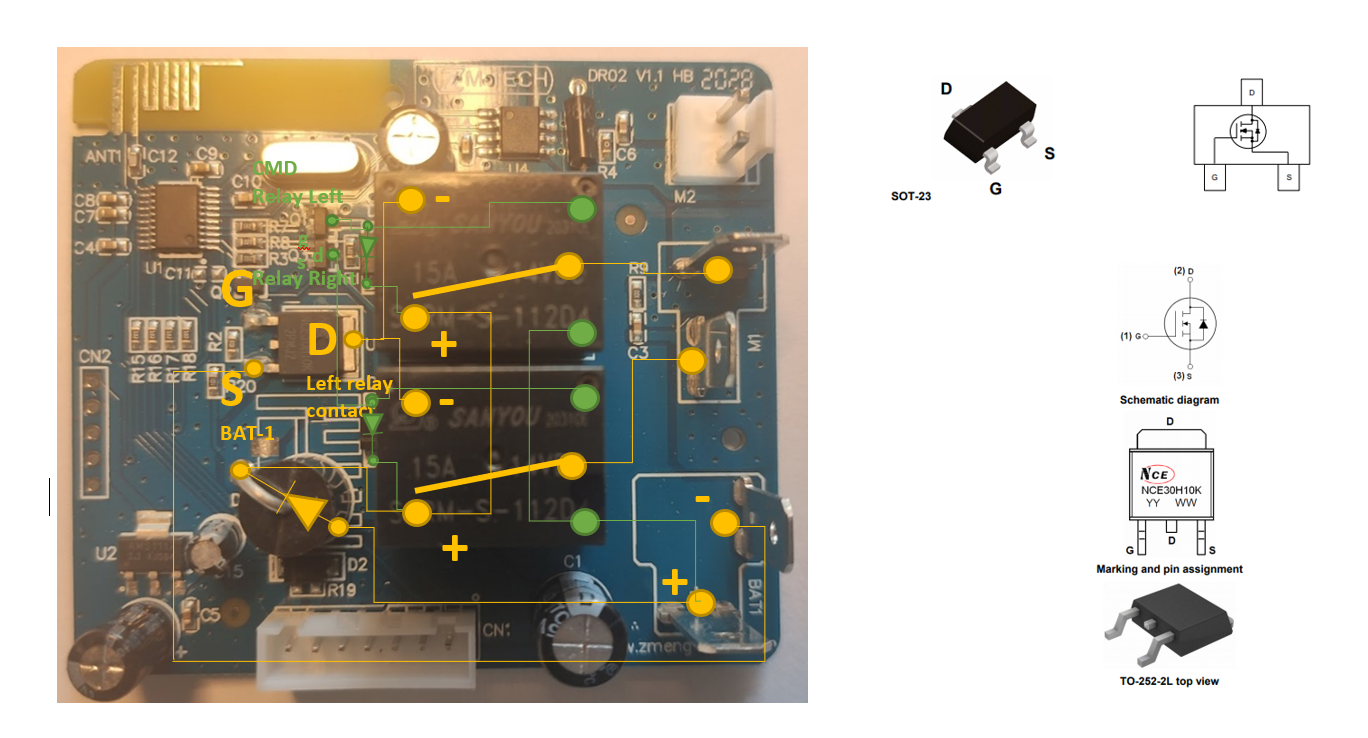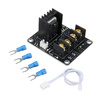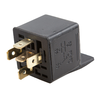Mercedes AMG Power Wheeler: Difference between revisions
Jump to navigation
Jump to search
mNo edit summary |
m (→Code) |
||
| (20 intermediate revisions by the same user not shown) | |||
| Line 4: | Line 4: | ||
{{Component| URUAV 550 12V Electric Reducer Gear Case with Motor for Kids Children Ride On Car}} | {{Component| URUAV 550 12V Electric Reducer Gear Case with Motor for Kids Children Ride On Car}} | ||
* https://www.thingiverse.com/thing:3001523 | |||
* Current consumtion nominal: 2A | * Current consumtion nominal: 2A | ||
| Line 9: | Line 11: | ||
== Controller upgrade == | == Controller upgrade == | ||
{{Component| 12V Relay 20A auto }} | [[File:Control-schematic-car.PNG|center]] | ||
Tachometer install | |||
* red - 12V | |||
* green signal wire 3000rpm = 6.23Hz 10V offset 5V duty 20% range = 3.9Hz - 6.7hz | |||
* black - gnd | |||
* yellow - 12v | |||
[[File:Tacho-wave.png|thumb|Downloaded from banggood|center]] | |||
=== Code new === | |||
-- relay 1 input | |||
gpio.mode(6, gpio.INPUT, gpio.PULLUP ) | |||
-- relay 2 input | |||
gpio.mode(7, gpio.INPUT, gpio.PULLUP ) | |||
-- power switch control output | |||
gpio.mode(5, gpio.OUTPUT ) | |||
-- relay 1 ouput | |||
gpio.mode(2, gpio.OUTPUT ) | |||
-- relay 2 ouput | |||
gpio.mode(1, gpio.OUTPUT ) | |||
relay1 = 0 | |||
relay2 = 0 | |||
function toggle_output_pwm() | |||
gpio.write(1, gpio.HIGH) | |||
tmr.delay(10000) | |||
gpio.write(1, gpio.LOW) | |||
end | |||
function deactivate_pwm_output() | |||
gpio.write(5, gpio.LOW) | |||
tmr.delay(10000) | |||
end | |||
function activate_pwm_output() | |||
gpio.write(5, gpio.HIGH) | |||
tmr.delay(10000) | |||
end | |||
function on_success_callback() | |||
val = adc.read(0) | |||
if val < 10 then | |||
print("System voltage low (mV):", val) | |||
else | |||
print("System voltage high (mv):", val) | |||
end | |||
end | |||
function check_relay1_input() | |||
relay1_input = gpio.read(6) -- gpio12 | |||
relay2_input = gpio.read(7) -- gpio13 | |||
print("Status relay 1:", relay1_input) | |||
print("Status relay 2:", relay2_input) | |||
if relay1_input == 0 then | |||
-- trigger output low | |||
if relay1 == 0 then | |||
deactivate_pwm_output() | |||
end | |||
-- activate relay 1 | |||
relay1 = 1 | |||
gpio.write(2, gpio.HIGH) | |||
activate_pwm_output() | |||
elseif relay2_input == 0 then | |||
-- trigger output low | |||
if relay2 == 0 then | |||
deactivate_pwm_output() | |||
end | |||
-- activate relay 1 | |||
relay2 = 1 | |||
gpio.write(5, gpio.HIGH) | |||
activate_pwm_output() | |||
else | |||
-- trigger output low | |||
print("Deactivate outputs") | |||
deactivate_pwm_output() | |||
-- activate relay 1 | |||
relay1 = 0 | |||
relay2 = 0 | |||
gpio.write(2, gpio.LOW) | |||
gpio.write(5, gpio.LOW) | |||
end | |||
end | |||
function check_relay2_input() | |||
end | |||
-- if the output is active deactivate it | |||
val = adc.read(0) | |||
if val > 10 then | |||
print("Output is active:", val) | |||
toggle_output_pwm() | |||
val = adc.read(0) | |||
print("Output is deactivated:", val) | |||
end | |||
mytimer = tmr.create() | |||
mytimer:register(10000, tmr.ALARM_AUTO, on_success_callback) | |||
mytimer:interval(100) -- actually, 500 mseconds is better! | |||
mytimer:start() | |||
mytimer1 = tmr.create() | |||
mytimer1:register(10000, tmr.ALARM_AUTO, check_relay1_input) | |||
mytimer1:interval(100) -- actually, 500 mseconds is better! | |||
mytimer1:start() | |||
mytimer2 = tmr.create() | |||
mytimer2:register(10000, tmr.ALARM_AUTO, check_relay2_input) | |||
mytimer2:interval(500) -- actually, 500 mseconds is better! | |||
mytimer2:start() | |||
=== Code old === | |||
-- relay 1 input | |||
gpio.mode(6, gpio.INPUT, gpio.PULLUP ) | |||
-- relay 2 input | |||
gpio.mode(7, gpio.INPUT, gpio.PULLUP ) | |||
-- power switch control output | |||
gpio.mode(1, gpio.OUTPUT ) | |||
-- relay 1 ouput | |||
gpio.mode(2, gpio.OUTPUT ) | |||
-- relay 2 ouput | |||
gpio.mode(5, gpio.OUTPUT ) | |||
relay1 = 0 | |||
relay2 = 0 | |||
function toggle_output_pwm() | |||
gpio.write(1, gpio.HIGH) | |||
tmr.delay(10000) | |||
gpio.write(1, gpio.LOW) | |||
end | |||
function deactivate_pwm_output() | |||
val = adc.read(0) | |||
if val > 10 then | |||
print("Output is active:", val) | |||
toggle_output_pwm() | |||
val = adc.read(0) | |||
print("Output is deactivated:", val) | |||
end | |||
end | |||
function activate_pwm_output() | |||
val = adc.read(0) | |||
if val < 10 then | |||
print("Output is deactivated:", val) | |||
toggle_output_pwm() | |||
val = adc.read(0) | |||
print("Output is activated:", val) | |||
end | |||
end | |||
function on_success_callback() | |||
val = adc.read(0) | |||
if val < 10 then | |||
print("System voltage low (mV):", val) | |||
else | |||
print("System voltage high (mv):", val) | |||
end | |||
end | |||
function check_relay1_input() | |||
relay1_input = gpio.read(6) -- gpio12 | |||
relay2_input = gpio.read(7) -- gpio13 | |||
print("Status relay 1:", relay1_input) | |||
print("Status relay 2:", relay2_input) | |||
if relay1_input == 0 then | |||
-- trigger output low | |||
if relay1 == 0 then | |||
deactivate_pwm_output() | |||
end | |||
-- activate relay 1 | |||
relay1 = 1 | |||
gpio.write(2, gpio.HIGH) | |||
activate_pwm_output() | |||
elseif relay2_input == 0 then | |||
-- trigger output low | |||
if relay2 == 0 then | |||
deactivate_pwm_output() | |||
end | |||
-- activate relay 1 | |||
relay2 = 1 | |||
gpio.write(5, gpio.HIGH) | |||
activate_pwm_output() | |||
else | |||
-- trigger output low | |||
deactivate_pwm_output() | |||
-- activate relay 1 | |||
relay1 = 0 | |||
relay2 = 0 | |||
gpio.write(2, gpio.LOW) | |||
gpio.write(5, gpio.LOW) | |||
end | |||
end | |||
function check_relay2_input() | |||
end | |||
-- if the output is active deactivate it | |||
val = adc.read(0) | |||
if val > 10 then | |||
print("Output is active:", val) | |||
toggle_output_pwm() | |||
val = adc.read(0) | |||
print("Output is deactivated:", val) | |||
end | |||
mytimer = tmr.create() | |||
mytimer:register(10000, tmr.ALARM_AUTO, on_success_callback) | |||
mytimer:interval(500) -- actually, 500 mseconds is better! | |||
mytimer:start() | |||
mytimer1 = tmr.create() | |||
mytimer1:register(10000, tmr.ALARM_AUTO, check_relay1_input) | |||
mytimer1:interval(500) -- actually, 500 mseconds is better! | |||
mytimer1:start() | |||
mytimer2 = tmr.create() | |||
mytimer2:register(10000, tmr.ALARM_AUTO, check_relay2_input) | |||
mytimer2:interval(500) -- actually, 500 mseconds is better! | |||
mytimer2:start() | |||
{| class="wikitable" | |||
| colspan="6"|[[File:DR01 V2.6 power schematicv4.PNG|alt=DR01 V2.6 power schematic|center|Power schematic DR01 V2.6]] | |||
|- | |||
|+ | |||
!Component | |||
!Current part | |||
!Data sheet | |||
!Replacement power part | |||
!Comments | |||
!Color | |||
|- | |||
|Power mosfet | |||
|NCE30H10K | |||
|<pdf>File:NCE30H10K-NCEPowerSemiconductor.pdf</pdf> | |||
|{{Component| MOSFET High Power Heated Bed Expansion Power Module}} | |||
| | |||
|yellow | |||
|- | |||
|Power relays | |||
|SANYOU SARM-S112D4 | |||
|<pdf>File:SANYOU_SARM-S112D4.pdf</pdf> | |||
|{{Component| 12V Relay 20A auto}} | |||
| | |||
|black | |||
|} | |||
== Speed control == | |||
Latest revision as of 11:40, 6 June 2021
| Mercedes AMG Power Wheeler |
|
| https://bogza.ro/index.php/Mercedes_AMG_Power_Wheeler | |

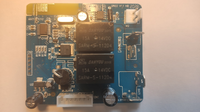
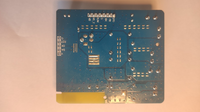
Power upgrade =

- Current consumtion nominal: 2A
Controller upgrade
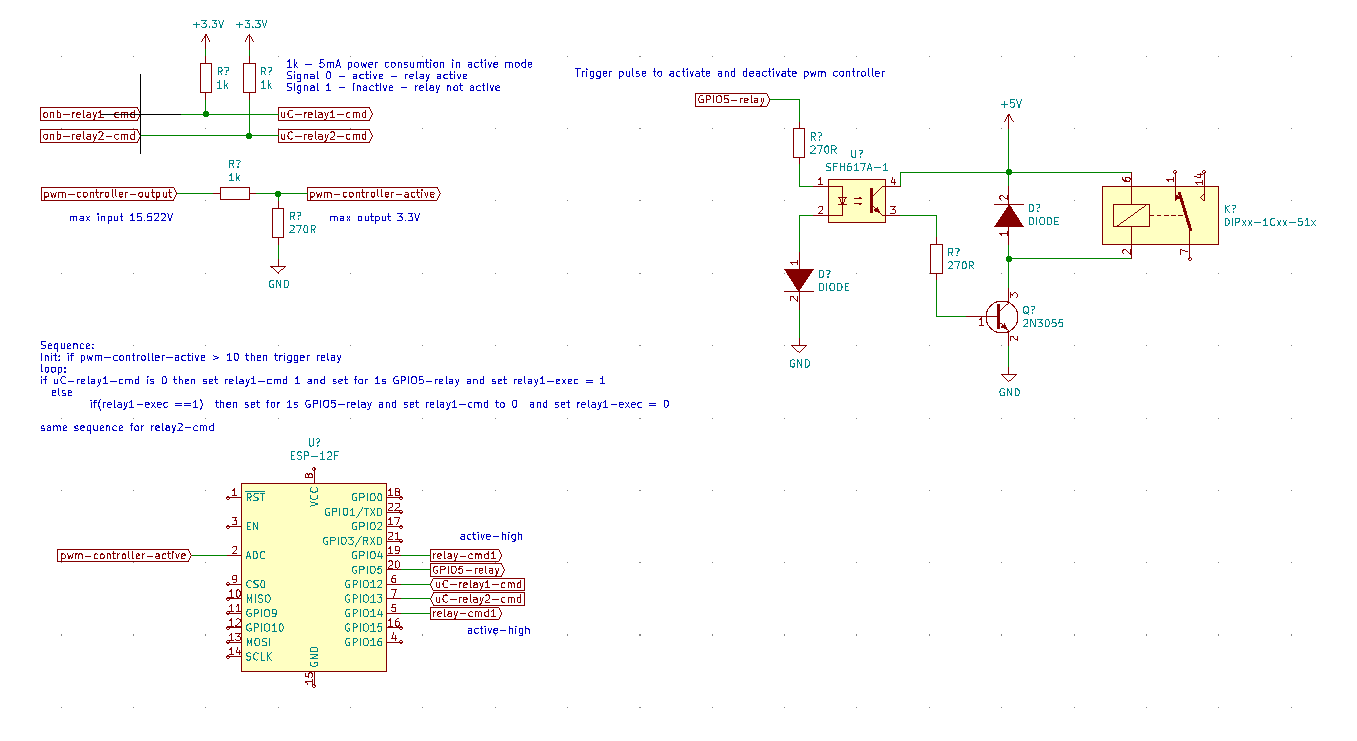
Tachometer install
- red - 12V
- green signal wire 3000rpm = 6.23Hz 10V offset 5V duty 20% range = 3.9Hz - 6.7hz
- black - gnd
- yellow - 12v
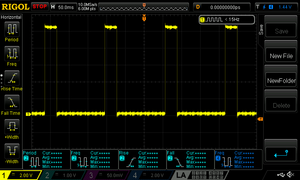
Code new
-- relay 1 input
gpio.mode(6, gpio.INPUT, gpio.PULLUP )
-- relay 2 input
gpio.mode(7, gpio.INPUT, gpio.PULLUP )
-- power switch control output
gpio.mode(5, gpio.OUTPUT )
-- relay 1 ouput
gpio.mode(2, gpio.OUTPUT )
-- relay 2 ouput
gpio.mode(1, gpio.OUTPUT )
relay1 = 0
relay2 = 0
function toggle_output_pwm()
gpio.write(1, gpio.HIGH)
tmr.delay(10000)
gpio.write(1, gpio.LOW)
end
function deactivate_pwm_output()
gpio.write(5, gpio.LOW)
tmr.delay(10000)
end
function activate_pwm_output()
gpio.write(5, gpio.HIGH)
tmr.delay(10000)
end
function on_success_callback()
val = adc.read(0)
if val < 10 then
print("System voltage low (mV):", val)
else
print("System voltage high (mv):", val)
end
end
function check_relay1_input()
relay1_input = gpio.read(6) -- gpio12
relay2_input = gpio.read(7) -- gpio13
print("Status relay 1:", relay1_input)
print("Status relay 2:", relay2_input)
if relay1_input == 0 then
-- trigger output low
if relay1 == 0 then
deactivate_pwm_output()
end
-- activate relay 1
relay1 = 1
gpio.write(2, gpio.HIGH)
activate_pwm_output()
elseif relay2_input == 0 then
-- trigger output low
if relay2 == 0 then
deactivate_pwm_output()
end
-- activate relay 1
relay2 = 1
gpio.write(5, gpio.HIGH)
activate_pwm_output()
else
-- trigger output low
print("Deactivate outputs")
deactivate_pwm_output()
-- activate relay 1
relay1 = 0
relay2 = 0
gpio.write(2, gpio.LOW)
gpio.write(5, gpio.LOW)
end
end
function check_relay2_input()
end
-- if the output is active deactivate it
val = adc.read(0)
if val > 10 then
print("Output is active:", val)
toggle_output_pwm()
val = adc.read(0)
print("Output is deactivated:", val)
end
mytimer = tmr.create()
mytimer:register(10000, tmr.ALARM_AUTO, on_success_callback)
mytimer:interval(100) -- actually, 500 mseconds is better!
mytimer:start()
mytimer1 = tmr.create()
mytimer1:register(10000, tmr.ALARM_AUTO, check_relay1_input)
mytimer1:interval(100) -- actually, 500 mseconds is better!
mytimer1:start()
mytimer2 = tmr.create()
mytimer2:register(10000, tmr.ALARM_AUTO, check_relay2_input)
mytimer2:interval(500) -- actually, 500 mseconds is better!
mytimer2:start()
Code old
-- relay 1 input
gpio.mode(6, gpio.INPUT, gpio.PULLUP )
-- relay 2 input
gpio.mode(7, gpio.INPUT, gpio.PULLUP )
-- power switch control output
gpio.mode(1, gpio.OUTPUT )
-- relay 1 ouput
gpio.mode(2, gpio.OUTPUT )
-- relay 2 ouput
gpio.mode(5, gpio.OUTPUT )
relay1 = 0
relay2 = 0
function toggle_output_pwm()
gpio.write(1, gpio.HIGH)
tmr.delay(10000)
gpio.write(1, gpio.LOW)
end
function deactivate_pwm_output()
val = adc.read(0)
if val > 10 then
print("Output is active:", val)
toggle_output_pwm()
val = adc.read(0)
print("Output is deactivated:", val)
end
end
function activate_pwm_output()
val = adc.read(0)
if val < 10 then
print("Output is deactivated:", val)
toggle_output_pwm()
val = adc.read(0)
print("Output is activated:", val)
end
end
function on_success_callback()
val = adc.read(0)
if val < 10 then
print("System voltage low (mV):", val)
else
print("System voltage high (mv):", val)
end
end
function check_relay1_input()
relay1_input = gpio.read(6) -- gpio12
relay2_input = gpio.read(7) -- gpio13
print("Status relay 1:", relay1_input)
print("Status relay 2:", relay2_input)
if relay1_input == 0 then
-- trigger output low
if relay1 == 0 then
deactivate_pwm_output()
end
-- activate relay 1
relay1 = 1
gpio.write(2, gpio.HIGH)
activate_pwm_output()
elseif relay2_input == 0 then
-- trigger output low
if relay2 == 0 then
deactivate_pwm_output()
end
-- activate relay 1
relay2 = 1
gpio.write(5, gpio.HIGH)
activate_pwm_output()
else
-- trigger output low
deactivate_pwm_output()
-- activate relay 1
relay1 = 0
relay2 = 0
gpio.write(2, gpio.LOW)
gpio.write(5, gpio.LOW)
end
end
function check_relay2_input()
end
-- if the output is active deactivate it
val = adc.read(0)
if val > 10 then
print("Output is active:", val)
toggle_output_pwm()
val = adc.read(0)
print("Output is deactivated:", val)
end
mytimer = tmr.create()
mytimer:register(10000, tmr.ALARM_AUTO, on_success_callback)
mytimer:interval(500) -- actually, 500 mseconds is better!
mytimer:start()
mytimer1 = tmr.create()
mytimer1:register(10000, tmr.ALARM_AUTO, check_relay1_input)
mytimer1:interval(500) -- actually, 500 mseconds is better!
mytimer1:start()
mytimer2 = tmr.create()
mytimer2:register(10000, tmr.ALARM_AUTO, check_relay2_input)
mytimer2:interval(500) -- actually, 500 mseconds is better!
mytimer2:start()
